Currently reading



Reading progress update: I've read 172 out of 976 pages.
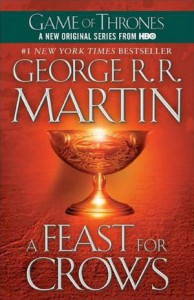
Lots of movement in Braavos.
Syrio Forel, I liked you two books ago, which is exceptionally rare for me in this series.
I really hope you are alive.
 2
2
By the throat

Nikos Kazantzakis is easily in my top 3 authors of all time and “Asceticism” (translated as “Saviors Of God” in English – although personally, I find the original Greek title a hundred times better and way more representative of the essence of the book) is clearly his best work, one of the most awe-inspiring and by far THE most genuine and profound philosophical and personal book I have ever read. Ever.
Asceticism / Saviors Of God is very short, but a life changing experience. I've actually read it before in college quite quickly, but words as strong as these need to be read again and again for the experience to make sense and I was too young and still too inexperienced a reader to understand that devouring a heavily philosophical book of this kind in a week was completely pointless.
I've always disagreed with Oscar Wilde (another top 3 author for me, coincidentally) that “if one cannot enjoy reading a book over and over again, there is no use in reading it at all”, because similarly to my other – definitely top 10 / maybe top 6 – favourite author Nick Hornby, “I don’t reread books very often; I’m too conscious of both my ignorance and my mortality”.
Nevertheless, this is one case where Oscar is totally spot on.
Take your time with Asceticism / Saviors Of God and remember to come back to it at a later time, or don’t bother at all. I remembered and I bothered and I was vindicated.
Nikos Kazantzakis believes that we come from an abyss of darkness, we end to an abyss of darkness and the luminous short interval is what we call life. Through Asceticism / Saviors Of God, Kazantzakis digs deep into his soul, then pours out his soul to express his agony and his fear of the unknown and of the inherent oppositions in life. Kazantzakis uses an individual, passionate, poetic yet coherent language to convey the philosophy that governs not only his work, but also his life, as he was a man of vision with a strong stance on hoping, fighting, being free and believing.
I cannot vouch for the translated version sadly, but if it’s half as breathtaking as the original text, then it’s a no-brainer, for me it would still be worth every second, every numbness (in awe).
 9
9
Kurt Vonnegut’s 8 Tips on How to Write a Great Story

1. Use the time of a total stranger in such a way that he or she will not feel the time was wasted.
2. Give the reader at least one character he or she can root for.
3. Every character should want something, even if it is only a glass of water.
4. Every sentence must do one of two things — reveal character or advance the action.
5. Start as close to the end as possible.
6. Be a Sadist. No matter how sweet and innocent your leading characters, make awful things happen to them-in order that the reader may see what they are made of.
7. Write to please just one person. If you open a window and make love to the world, so to speak, your story will get pneumonia.
8. Give your readers as much information as possible as soon as possible. To hell with suspense. Readers should have such complete understanding of what is going on, where and why, that they could finish the story themselves, should cockroaches eat the last few pages.
 7
7
Reading progress update: I've read 49 out of 387 pages.

Like all walls it was ambiguous, two-faced. What was inside it and what was outside it depended upon which side of it you were on.
On cloud nine

I am furious at myself for having avoided this book for so long, on the basis that, as I've heard and occasionally read, it would be “confusing”.
WHAT?
I have no idea what Cloud Atlas needs to be compared to in order to get classified like that, but it will probably take something really simplistic, because plotwise it is a perfectly comprehensible and enjoyable book.
I’m not going to get into details about the plot, because the storylines here (ok, so everybody knows it consists of six interweaving stories already, so this cannot count as a spoiler, can it?) are so brilliantly built that the less you know beforehand the better.
However, I will say that the miraculous thing about David Mitchell’s prose is that he manages to occupy different depictive voices so convincingly, I often had to wonder how I wasn't reading the collective product of several authors instead! (That good actually, yes).
Cloud Atlas is a genius story about the art of storytelling, with profoundly existential symbolisms, that demolishes fundamental literary stereotypes by joining together science fiction, historical fiction, political thriller, modern comedy (it is hilarious at times) and contemporary prose, without reading like a mixed bag at all. It is in fact an epic, solid adventure across time and the world, a powerful commentary on human greed and lust for control and a completely sui generis novel that is also an addictive page-turner.
A half-read book is a half-finished love affair.
And David Mitchell leaves nothing half-finished or ill-resolved for sure.
Hugely recommended.
- “We’re brothers! Don’t you have a conscience?”
- “I sat on the board of a merchant bank for thirty years.”
- “My name is Gwendolin Bendincks.”
- “Don’t blame me.”
- Please remember, this isn’t an interrogation, or a trial. Your version of the truth is the only one that matters.
- Truth is singular. Its “versions” are mistruths.
Sense and sensibility
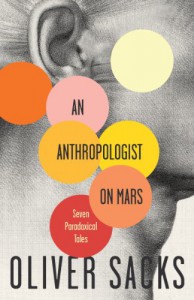
“He feels he has been given “a whole new world”, which the rest of us, distracted by color, are insensitive to. He no longer thinks of color, pines for it, grieves its loss. He has almost come to see his achromatopsia as a strange gift, one that has ushered him into a new state of sensibility and being.”
Oliver Sacks grabs my attention and holds it. He moves me and he keeps me enthralled in worlds of special personality and behavioural traits, where ambiguity of “communication”, “perception”, “memory”, “intelligence” and “illness” prevails.
Through his writing, Oliver Sacks connects his own subjects to their surrounding contexts seamlessly and introduces me to a different angle of the ways of the brain.
And in An Anthropologist On Mars he does it again. This book is an extremely interesting account of seven odd, mind-bending neurological cases that Sacks, again, approaches with care, sensitivity and personal feel.
My only complaint, having also read his excellent Man (who mistook his wife for a hat), is that the Anthropologist felt a little dry by comparison. A little “let’s get the clinical stuff down first and I’ll add the emotion later on”. But that’s literally a little and only by comparison.
A fascinating introduction to the quirks of the human mind by a highly acclaimed scientist and wonderful author. Definitely recommended (but read the Man as well).
 10
10
Five More Hans Christian Andersen Tales That Could Use a Disney Movie Adaptation

Some of the world’s most well-known fairy tales were written by Hans Christian Andersen. It’s no wonder his beloved short stories have survived since the early 1800s and have been told and re-told in countless different formats.
However, some of the most memorable versions of these stories have come from Disney. With major adaptations such as The Little Mermaid and Frozen (a loose adaptation of The Snow Queen), Disney brought these stories to life for children everywhere. But what other Andersen tales should Disney bring to life? We've got a few suggestions.

1. The Ugly Duckling: As one of Andersen’s most beloved stories, it’s surprising Disney hasn’t picked this up as a major animated film (though they did make a Silly Symphony animated short). The story is about a duck who is outcasted by his own family for looking different only to eventually be accepted and embraced by a group of swans. Eventually, the ugly duckling becomes a swan, himself.
If Disney brought this story to life, it could teach lessons to children not only to believe that things get better but that family isn’t necessarily about blood. Your family consists of the people who treat you like family. Also, while this is briefly touched on in the Silly Symphony short, how would the ugly duckling react if his family decided to accept him after he became a swan?
This story would surely feature dozens of "Let It Go"-style musical numbers as the ugly duckling accepts himself and his new family.
2. The Princess and the Pea: Andersen’s version of the story follows a prince who wants to marry a “real” princess. When a girl claiming to be a real princess comes to the castle in the middle of the storm, the queen is immediately suspicious. So she puts a single pea underneath twenty mattresses and has the princess sleep on top of them.
When asked about how she slept, the princess immediately responds that she was miserable and had several bruises. This solidifies that she was a real princess since she was able to feel a pea underneath all of those mattresses and the prince takes her as his wife.
While the story ends with a happily ever after, one must question how the characters got there. The prince basically chose the girl as his wife because a tiny seed bothered her while sleeping. This does not sound like the beginning of a healthy relationship and the whole concept could be analyzed by feminist groups for hours. The prince obviously set his expectations too high in order to get the “perfect” woman. Disney could either take the angle of having the princess leave the prince for being so shallow or the princess could be the “perfect” girl in a love triangle involving the prince and an average girl. The story could be used as a stepping stone to show children that no one is perfect...an ugly duckling, you might say?

3. The Shepherd’s Story of the Bond of Friendship: Disney hasn’t had a great film revolving around a friendship between two dudes since The Fox and the Hound. This Andersen tale could be the next great story about putting friendship before relationships. The story follows the narrator as he grows up with the love of his life, Anastasia.
Things get complicated when the boy’s friend, Aphtanides, falls for Anastasia as well but Aphtanides ends up putting his friendship with the narrator first.
While the story is simple enough, Disney could easily add more layers to make it a multi-faceted story about the importance of friendship. What other arguments did the two friends go through? Could there be another villain? Disney is no stranger to adding more to stories and characters and this tale would be the perfect way to enforce important lessons while adapting a classic story.

4. There Is No Doubt About It: Stories about misunderstanding have been told countless times in different formats but only Disney would be able to deliver a story with comedic flair. This Andersen story follows a community of birds who distort a story so drastically, the original point gets lost. It starts off when a hen overhears another hen plucking out her feather. After the story gets passed along, it ends up turning into a bloodbath as each bird slowly distorts the story from what really happened.
This story would be hard to work into a full-length animated movie but it could be a nice short film where children can learn the importance of listening to a story before passing it on to others. It could even show dark turns by showing the dangers of revealing a story to the wrong person. Also, while it would be humorous to see this story with birds, imagine if it focused on classic characters such as Mickey, Minnie, Donald and Goofy. That would be a hilarious good time for both children and older Disney enthusiasts alike.

5. The Girl Who Trod On the Loaf: Don't let the weirdo title turn you off—this is a classic story of redemption and forgiveness that Disney audiences haven’t seen since Beauty and the Beast. It follows a vain and selfish girl named Inger who takes everyone in her life for granted. After getting a loaf of bread from the family she works for, she heads home only to be stopped by a mud puddle.
Since she is too scared to get her dress ruined, she uses the loaf of bread as a stepping stone. Inger regrets that decision as soon as she sinks to the bottom of the mud where she is turned into a statue by a bog witch for several years. After spending years regretting her cruel ways, Inger is eventually turned into a bird and she gathers up bread crumbs for the hungry birds to eat. She eventually accumulates enough breadcrumbs to equal the loaf of bread she stepped on and her soul is free to go to heaven.
This story takes a darker turn than most Disney tales, but remember: the original source material forThe Little Mermaid also differed drastically from the final Disney product. It would be interesting to see Inger turn back into a human after finally redeeming herself similar to how the Beast fromBeauty and the Beast became a better person. This would give children a chance to see a flawed character transform from evil to good and how she works toward redemption.
---
Did we miss a classic Andersen tale? Tell us your favorite story you wish could be a Disney movie.
 4
4
Reading progress update: I've read 50 out of 400 pages.

Now as I was about to say, my biggest problem in the beginning was that I was too content with my life. Writers need anxiety to draw on for inspiration; if everything's going peachy, you're sunk. Fortunately in my case, puberty came early.
Tonight
Alright alright, I admit it; I'm actually watching the UEFA Europa League final match on TV.
But what am I supposed to do during halftime anyway?
START Bettie's original text
European Literature Night takes place May 14 in cities throughout Europe, with readings, performances, panel discussions and more.
Prague’s Literature Night will take place in Žižkov and includes work from writers near and far. There will likewise be events held in cities throughout the Czech Republic.
In Amsterdam, authors, including Czech writer Jaroslav Rudiš, have submitted a text inspired by the theme “Famous Last Words”. They will discuss what they wrote during the evening.
In Bratislava, actors will read Bohumil Hrabal’s Postřižiny as well as Víťo Staviarsky’s Kale topanky (Dark Shoes), which you can read an excerpt of in B O D Y if you aren’t able to get to the Slovak capital by this evening.
Kiev’s Literature Night has Czech writing, including Milan Děžinský, whose work you can read in B O D Y.
London’s event, chaired as always by Rosie Goldsmith, has Polish author of The Assassin From Apricot City as part of a group of six writers at The British Library. Read an excerpt from The Assassin From Apricot City in B O D Y
In London there will also be a spotlight shined on graphic novels, with a panel discussion that includes Czech comic artist Lucie Lomová, creator of Divoši (Savages), “the true story of a Czech ethnographer who befriends a Brazilian tribesman and brings him to Prague in 1908”. For those of you who don’t read Czech, there is also a French edition of the comic.
There is a lot of other great stuff – British literature in the subways of Yerevan, readings of Zakhar Prilepin in Sofia, and much more.
 3
3
We are all democrats now

This book is an interesting attempt to explore the conceptualisation and implementation of democracy starting from its roots in ancient Greece up to our own time, in order to identify, through theoretical scrutiny, why it’s still relevant today.
Why and how. Despite its mishaps, despite being a key word here, because a quick read (aka the pointless type of read) could mislead the reader to suggest that democracy might as well be ditched altogether for something else. Why not! Don’t all self-proclaimed democratic governments abuse it all the time anyway?
Well no, this is so not what the book is suggesting, even though the authors’ criticism on contemporary western democracies is unsurprisingly very harsh (and rightly so). Indeed, the book places heavy emphasis on the fact that paradoxically, democratic abuse tends to be the very way democracy is practiced today, but this is certainly not because there’s something fundamentally wrong with the theoretical framework of democracy itself. On the contrary, the theoretical framework of democracy is so perfect, from a philosophical point of view anyway, that it’s become the world administration’s favourite excuse for all political malpractice under the one-fits-all “democracy” umbrella.
So perfect and so intentionally overlooked. And this is where the authors intervene to suggest that because democracy’s theoretical framework is so perfect, democracy is always relevant and therefore there is scope in going back to its essence; to understanding what it really stands for, as today the term seems to be entirely up for grabs! Because, let’s face it: nobody can really accurately define democracy, and yet everybody agrees it’s “something good”.
In this respect, Democracy in What State? gathers the views of some of the greatest (and most hyped these days it seems, but I’m pretending this isn't the case) minds of our time on the de-democratising effects of the neoliberal status quo dominating modern societies (to the contrary of the egalitarian presupposition of democracy), as well as on the essential elements of meaningful practice of democracy.
Obviously, gathering Badiou, Bensaïd, Brown, Nancy, Rancière, Ross and Zizek together with a delightful preface by Agamben in a single book is an achievement enough. Also, of the authors present in this book, Wendy Brown and Kristin Ross are the two that I had not read before at all, so I’m grateful for their excellent contributions as well. Moreover, the authors make extensive and extremely interesting references to Plato, Marx, Mao, Rousseau etc, which provide the necessary context to their theses.
Nevertheless, I found there isn't enough closure here, because these – otherwise extremely intriguing – thoughts read like a bit of a potpourri lacking a specific focus on today. Not that this is a big surprise and you can’t really condense the minds of seven theorists into some 150 pages; I knew that to begin with. But I couldn't imagine how much this book would make me want to go back to other relevant essays I've read, by Cornelius Castoriades, by Raoul Vaneigem or by the very authors in this book indeed!
Warning: Greek speaking readers only
If you don’t want to start questioning your basic comprehension capabilities, do not try the translated version in Greek. Patakis may be a fine choice of a publisher for fiction, but philosophy works completely differently. I thought I was being bold by ignoring this rule (of which I was perfectly aware, mind you), but it turns out I was simply mistaken. The translation is just incoherent and I had to turn to the English version in the end.
 8
8
 6
6
The king will come

George R.R. Martin, the fabulous ruthless troll on a killing spree, returns with A Clash of Kings, the second book in the series A Song Of Ice And Fire and, again, does wonders in recording the fate of everyone I loved to hate and hated to love in A Game Of Thrones.
A Clash Of Kings picks up exactly where A Game Of Thrones left off and everything I said HERE about the first book is again very much the case, with the exception of fluidity perhaps, as things felt a little slower this time. Indeed, I have to admit that “get on with it George” crossed my mind twice or thrice, but the general feeling I got from reading this second monster book was that, similarly to A Game Of Thrones, it excels at pretty much everything really.
My only complaint to the deadly genius George would be that characters who made the first book the masterpiece that it is and who are destined to change the course of The Known World (it’s just so obvious) are now diminished to randomly wandering around and wasting everyone’s time before they grow back to being massively intriguing.
A somewhat temporary inconvenience; not to go completely unnoticed however.
Swords, blood, thrones, fire, kings, squires, sex, ice and winter. And direwolves.
 13
13
Reading progress update: I've read 72 out of 216 pages.

Absolutely. You see, it appears there's a chappie unknown for whom Maud has an absolute pash. It seems she met this sportsman up in Wales last summer. She was caught in the rain, and he happened to be passing and rallied round with his rain-coat, and one thing led to another. Always raining in Wales, what! Good fishing, though, here and there. Well, what I mean is, this cove was so deucedly civil, and all that, that now she won't look at anybody else. He's the blue-eyed boy, and everybody else is an also-ran, with about as much chance as a blind man with one arm trying to get out of a bunker with a tooth-pick.
P.G. Wodehouse, I love you.
Reading progress update: I've read 77 out of 898 pages.
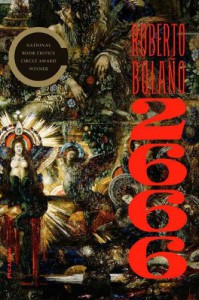
I am curious, negatively biased and very happy to be proven wrong.
Luckily, there are still 821 pages for that to happen.
 3
3
Hey, you've got to hide your love away
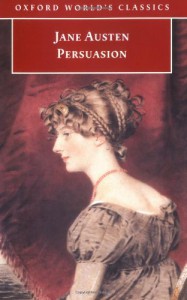
I don’t believe in coincidence and commonly used oversimplifications of value and talent. Most things are what they are for a reason. Jane Austen is a literary myth for a reason. And it’s not like I needed to read Persuasion in specific to confirm this, but this book certainly worked as a bloody good reminder for me, as I haven’t touched any Austen in years.
Persuasion, her last completed novel, is a book on second chances, on hindsight and on breaking free from ghosts of the past. It’s not as funny and quirky as Emma, it’s not as sparkling and witty as Pride And Prejudice (my personal favourite), but it has a lot more feeling and a bigger heart than both (combined as well probably). And it’s the most refined and mature Austen I've read.
And that’s not even the main reason this book sucked me in so much.
One of the things I adore about Austen’s writing is the hidden things. Despite her literary status as giant, some people out there actually believe that Jane Austen’s novels are limited to romance storytelling in 18th century England and therefore, watching the BBC miniseries or one of the movies will do just as well.
These people are simply misinformed. (Although both the miniseries and the movies are great fun by the way - some of them have even grown to become pretty legendary in their field!) Obviously, as historical romance is at the core of any Austen novel, she’s a pioneer and a massively influential author of the genre. But she is also a master of sarcastic - and even cynical sometimes - social commentary and a genius in addressing strikingly existential issues (and daring to go to great depth as well), when you least expect it. The key characteristic in her prose though is that these things are always hidden; lurking between her lines and never too obvious. Austen’s writing isn't screaming to be taken seriously. It really is Serious Art. And Persuasion falls right in the heart of this signature Austen technique; the hidden things.
In Persuasion, social caste, gender, friendship, appearances and looks-obsession, silliness and marriage are all being commented upon critically through the eyes of Anne mostly, the completely ignored middle daughter of an absurdly vain baronet, Sir Walter Elliott, who has to be the most pathetic character Jane Austen has even invented (ok, so I haven’t read Mansfield Park and Northanger Abbey yet, but how can anyone be worse. Seriously). In fact, almost everybody sucks in this story and those who don’t, felt otherwise annoying to me; I absolutely couldn't relate to anyone at all, not even Anne, because let’s face it; she’s not the typical bubbly Austen girl, she gets persuaded way too easily and as predictable as it will sound, I’m still rooting for the Elizabeth Bennets and the Emma Woodhouses of this world who hold their own.
And yet it doesn't matter. Austen is again killing it plotwise too (I already said the prose kicks arse, didn't I?), suffice to say she’s too amazing an author to bother with a just-tedious heroine. My lips are sealed, but:
“All the privilege I claim for my own sex (it is not a very enviable one, you need not covet it) is that of loving longest, when existence or when hope is gone.”
Anne may not be exciting, but Jane Austen’s superpowers are not to be taken lightly. If you've read her before, you know.
Reading progress update: I've read 75 out of 227 pages.
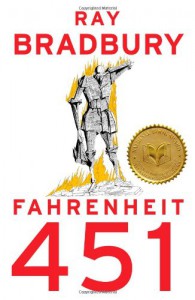
"It's fine work. Monday burn Millay, Wednesday Whitman, Friday Faulkner, burn 'em to ashes, then burn the ashes. That's our official slogan."
Classic-That-Lives-Up-To-Expectations alert.
Actually, my expectations are already exceeded in this case.
What a start!







 2
2
